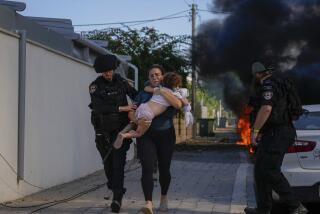Only Answer Is to Face Reality : War crimes charges against Serbian figures may force Bosnian issue
- Share via
After World War II, war crimes trials were held at Nuremberg and Tokyo, but Germany and Japan had lost that war. War crimes trials are being planned by the United Nations for Bosnian Serb political leader Radovan Karadzic and military commander Ratko Mladic, but the Bosnian Serbs are winning their war. Does this make the imminent indictments a grotesque farce?
It would seem so on the surface, but in the messy internecine fights of the post-Cold War era, deterrence may yet prove more effective against key individuals than against entire states. The Serb nation as a whole must not be indicted; by the same token, the Serb leadership must not be excused.
On the ground in Bosnia, to be sure, the action of U.N. prosecutor Robert Goldstone in naming Karadzic and Mladic radically undermines the official neutrality of the U.N. Protective Force (UNPROFOR) and fearfully complicates daily peacekeeping operations. In the wake of Goldstone’s action, with the latest, badly tattered cease-fire due to expire on May 1, the Bosnian Serbs have indicated that they will no longer guarantee air access to Sarajevo even for visiting diplomats. The Serbs have been blocking the delivery of supplies, especially fuel, to UNPROFOR in Sarajevo since the war crimes accusations were made against their leadership. France, blaming Russia for tilting toward the Serbs and the United States for tilting toward the Muslims, threatens almost daily to pull its forces out.
Should U.N. prosecutor Goldstone be faulted for making a bad situation worse? We do not think so. Before his action, peace was by no means at hand in Bosnia. After it, given the Serb reaction, the United Nations may be forced to reconsider its stance of neutrality. Though an abandonment of neutrality would not in and of itself bring peace, it would end a policy of self-defeating contradiction and, to that extent, bring peace nearer.
Despite its official neutrality, UNPROFOR has prevented the Bosnian Serbs from achieving the quick, crushing victory that they counted on at the start. One should not be surprised that the Bosnian Serbs have often treated UNPROFOR as the enemy or, at best, the enemy’s friend. Frantic U.N. diplomacy and a paradoxically accommodating attitude toward the Bosnian Serbs (not to speak of the background threat of NATO military involvement) have kept the hostility of the Bosnian Serbs toward UNPROFOR in check. Still, the only real result has been the bloody and unsustainable stability of stalemate.
That kind of stability could now end. If it does, the U.N. war crimes indictments of Karadzic and Mladic, rather than being a vain and counterproductive gesture, may prove that truth is the most direct and, in the end, the only safe road to peace.
More to Read
Sign up for Essential California
The most important California stories and recommendations in your inbox every morning.
You may occasionally receive promotional content from the Los Angeles Times.













